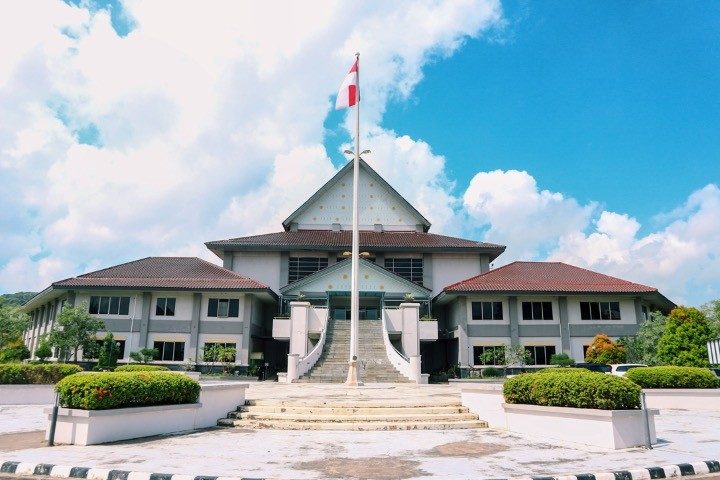
People who engage in physical LGBTQ+ relationships as well as sex outside of marriage in Indonesia may soon be imprisoned, according to the Parliament’s amendment to the country’s colonial-era criminal code on Dec. 6. Other amendments include prohibiting criticism of the president and state institutions.
The most updated version of the code, known as KUHP, is slated to take effect within three years, as implementing guidelines are drafted.
At a press conference after Tuesday’s plenary session, Law and Human Rights Minister Yasonna Laoly said that public opinion had been taken into account in the drafting of the legislation.
He added: “It is not possible for the criminal code to accommodate 100 per cent (of all the wishes), but I would like to emphasize that the government has no intention to silence the critics.”
The government was initially expected to pass the bill in September 2019, but postponed its decision after public backlash criticizing the legislation as strict. Public consultations were then organized.
In response, Parliament amended some of the articles, though critics insinuate that the watered-down version does not have enough substantial changes. Opponents characterized the bill’s passage as a “huge setback” for Indonesia’s young democracy.
The Alliance of Independent Journalists (AJI) has called on the House of Representatives and the government to postpone the passage of the bill, “as the set of laws can eradicate the freedom of the press and democracy in Indonesia.” “AJI will continue to voice this until the problematic provisions are dropped,” it said in a statement.
Under the new law, insulting a sitting president will be a crime, with offenders facing up to three years in prison. The president himself must file a complaint for the offender to be charged.
In a meeting organized by President Joko Widodo on Nov. 28, Deputy Minister for Law and Human Rights Edward Omar Sharif Hiariej clarified that the “insult to the government” charge is limited to the presidential institution, while the “insult to state institutions” is confined to legislative bodies, including the House of Representatives, the Constitutional Court, and the Supreme Court.
He elaborated that there are stringent guidelines to differentiate between what constitutes a criticism of the president or state institutions and what constitutes an insult.
Also under the amended code, people who have premarital or extramarital sex can expect up to a year in prison, but the charges must be started by a close relative, such as a spouse, parent, or child. Those who cohabit without getting married can face six months in prison.
The code would effectively outlaw LGBTQ+ relationships. The government does not recognize same-sex marriages, and thus any sexual activity between people of the same gender would be considered extramarital.
It is unclear whether couples traveling to Indonesia and staying in hotels will be monitored and penalized. Minister Hiariej said that the authorities will act only if there is a complaint, and raids will not be carried out.
Importantly, the code also punishes abortion except in the cases of medical emergencies or rape.
The new criminal code recognizes “living laws,” which include the strict syariah legislation, which means local governments across 34 provinces can enact their own laws according to the criminal code. Thus, while the criminal code is applicable to the entire country, including Bali, each province can implement its own laws based on the code. The new laws could become controversial there, given the island’s reliance on tourism, as foreigners could run afoul of other provisions in the criminal code.
Indonesian citizens and foreigners alike will be under the auspices of the new laws. Business groups argued that the new code would reduce the number of tourists and amount of foreign investment, and the national tourism board described the new code as “totally counter-productive.”
“We deeply regret that the government has closed their eyes. We have already expressed our concern to the ministry of tourism about how harmful this law is,” said Maulana Yusran, deputy chief of Indonesia’s tourism industry board.
Indonesia has been pondering revising its criminal code since declaring independence from the Dutch in 1945. Minister Hiariej said prior to the bill’s passage that he was proud his country would have a criminal code “in line with Indonesian values” and that it was time to move beyond its colonial-era laws.
Indonesia’s population is mainly Muslim, but has considerable pockets of Hindus, Christians, and people of other faiths. Most Indonesian Muslims practice a moderate version of Islam, but in recent years religious conservatism has influenced the country’s politics more.
The new code was passed with the approval of all parties in the Parliament, which is dominated by a large government coalition as well as Islamic parties and groups. Defending the passage of the bill against its opponents, Minister Laoly told Parliament on Tuesday: “It’s not easy for a multicultural and multi-ethnic country to make a criminal code that can accommodate all interests.”
While there are sharia-based provisions in the criminal code ratified by Parliament on Tuesday, Islamist hardliners could have been upset by other articles that could be used to crush the spread of extremist ideologies, analysts say.
On Dec. 7, a suspected Islamist militant, incensed by the new criminal code, killed one other person and wounded at least 10 in a suicide-bomb attack at a police station in the city of Bandung.
The suicide bomber, identified as Agus Sujatno, was believed to be linked to the Islamic State-inspired group Jamaah Ansharut Daulah (JAD) and had previously been imprisoned on terrorism charges, being released in late 2021. Indonesian police chief Listyo Sigit Prabowo told a news conference that investigators found dozens of documents opposing the country’s new criminal code at the crime scene.
West Java police chief Suntana told Metro TV that authorities had discovered a blue motorbike at the scene, which they believed was used by the attacker, and attached to the bike was a note with a message lambasting the new criminal code as “an infidel product.”
Todd Elliott, a senior security analyst at Concord Consulting in Jakarta, said it was likely the attack had been premeditated and was an ideological dismissal of the country’s new laws.
“While all the attention is on some of these sharia-based provisions in the criminal code and how that is an indication of the spread of conservative Islam in Indonesia, there are also changes in the criminal code that hardliners would not support,” he said, “including outlawing any ideology that goes against the state ideology, Pancasila, and that would also include extremist ideology.”



